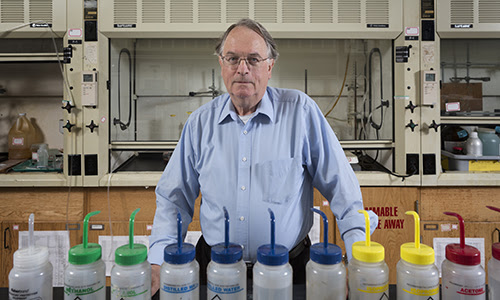
Article from Vol. 4 No 20, February 10, 2023, UUPconnect
Most people who had been invited to the State of the Union address and were about to have a private chat with Senate Majority Leader Chuck Schumer might use that time to tout their accomplishments—especially if they were a Nobel Laureate.
Not M. Stanley Whittingham.
Whittingham—a Binghamton Chapter member, a distinguished professor of chemistry and materials science, and a 2019 Nobel Prize winner—said he planned to spend his precious time with Schumer touting Binghamton University and Broome County, where the campus is located.
“Anything we can do to get more, to get more traction to Binghamton, is good,” Whittingham said in a Feb. 7 Zoom interview from his hotel in Washington, D.C., as he prepared to attend the State of the Union address that evening as a guest of Schumer. “Clearly, one of our charges as a university is to help the state and help the region.”
As for Broome County? “It’s a great place to raise a family,” said the British-American Whittingham, who has spent most of his career at Binghamton. His wife, Georgina Whittingham, is also a UUP member at SUNY Oswego.
Whittingham won the Nobel Prize in Chemistry for his role in the development of lithium-ion batteries, which are now widely used in mobile devices such as cell phones and laptop computers, as well as most electric cars. A research building at Binghamton is named for him, and he’s been a leading voice in advocating for federal dollars to help fund innovations in battery technology and clean energy.
His meeting with Schumer before President Biden’s address to the nation was not the first time he’s spoken with the majority leader—who has also been a steady supporter of UUP and public higher education.
It was Schumer who backed Binghamton University’s successful proposal for the federal Build Back Better Regional Challenge Grant. Binghamton’s proposal, the New Energy New York project, has received more than $113 million in federal and state funding for this project, which will expand research and workforce development in emerging battery technologies.
Binghamton was one of 60 proposals nationwide selected out of 529 applicants as a winner for Phase I of the grant, which provided $500,000 of startup funding, and which qualified Binghamton to go on to be selected as a winner.
Whittingham was instrumental in the development of the winning proposal, which has the potential to be an economic windfall for the Southern Tier. The region needs help: Broome County has the third-highest poverty rate in the state at 8.54%, based on a report on poverty in New York published in July 2022 by the New York State Community Action Association.
As exciting as the prospect of the Build Back Better project is, Whittingham said that he would like to see better state funding for SUNY, and certainly for his home campus. Campus infrastructure has not kept pace with the growth of the Binghamton student body, he said; there were 11,000 students when he started at Binghamton in 1998, and now there are 18,000.
“We could always use more money,” he said. “We’re desperately short of lecture halls on campus; we’re desperately short of dorm rooms. We need new research buildings on campus. Research funding is going up, but we have to have the facilities to house the students.”
And he is grateful that he can use the attention his research has garnered to call attention to both the highlights and the needs of his campus.
Said Whittingham of his once-in-a-lifetime night at a national event: “It’s an honor for me, but it is also an honor for Binghamton.”